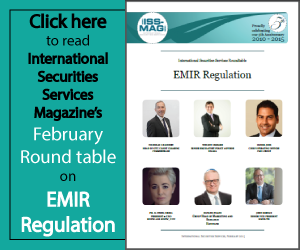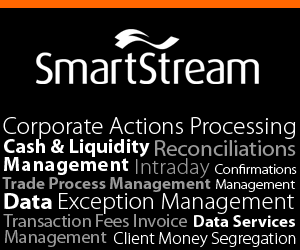The U.S.' Depository Trust & Clearing Corp. leads the pack of eight exchanges, securities depositories and clearinghouses tapped by U.S. regulators as potential threats to the stability of the financial system which need closer government oversight.
Three of the eight organizations tapped by the Financial Stability Oversight Council (FSOC) as so-called systematically important financial market utilities, or SIFMUs, are subsidiaries of DTCC. They are: Depository Trust Company; National Securities Clearing Corp; and Fixed Income Clearing Corp. They join the Chicago Mercantile Exchange; ICE Clear Credit; the Options Clearing Corp., Clearing House Payments; and CLS Bank International.
The FSOC, set up under the Dodd-Frank Wall Street Reform Act to prevent another financial crisis, consists of top regulators that include Treasury Secretary Timothy Geithner and Federal Reserve Chairman Ben Bernanke. Designation of the SIFMUs coincided with the FSOC's announcement it supported the implementation of structural reforms to mitigate the "run risk" in money market funds.
Among the criteria used by the FSOC in making its selection were the size of the organization and their interconnectedness -- or how much its downfall would affect others. The common thread to the eight firms chosen is that they help process and steer transactions "through the plumbing" of the financial system, says the FSOC. DTC is the U.S.' national securities depository which settles trades, while NSCC and FICC are clearinghouses, which serve as middlemen to transactions and ensure they are settled even if the counterparty to a trade goes bust. The CME and ICE Clear operate swaps clearinghouses, while OCC is the clearinghouse for listed options. Clearing House Payments provides payment, clearing and settlement services to its member banks and other financial institutions while CLS operates the largest multicurrency cash settlement system to mitigate settlement risk in the foreign exchange market.
The eight SIFMUs are considered the least controversial in long line of companies -- both banks and non-banks -- which will eventually be placed in the regulatory spotlight as critical to the functioning of the US financial system. The eight received notifications in May that they would fall under the new designation and had the right to request a hearing if they disagreed. They did not.
But many other firms, such as hedge funds, asset managers, and unregulated money market funds are trying to escape the similar category of systematically important financial institutions or SIFIs. The reason: it carries higher capital buffers and more stringent and costly risk management strategies they are hesitant to undertake. That's not the case for the eight SIFMUs, which rely on funds contributed by their members as backup and are already regulated either the Federal Reserve, the Securities and Exchange Commission and the Commodity Futures Trading Commission. Those are the agencies which will now set the higher operating standards.
"While we will continue to closely assess the implications of this designation, DTCC remains committed to consistently operating to the highest of risk management standards," says President and Chief Executive Michael Bodson in a statement. "We do not anticipate these designations will either significantly change our day to day business or how we work with our clients."
The FSOC's report says that in the four years since the financial crisis, the US financial system has been made more resilient with requirements for banks and other institutions to follow the Dodd-Frank Wall Street Reform Act. But as it notes there is still plenty of work to be done to address structural vulnerabilities within the financial system. Recent failures of brokerage firms MF Global and Peregrine Financial; the nearly $6 billion trading loss at JP Morgan and abuses involving setting of a key global interest rate by banks brings home just how vulnerable financial firms remain.
Written by Chris Kentouris, Editor-in-chief (Chris can be contacted through












